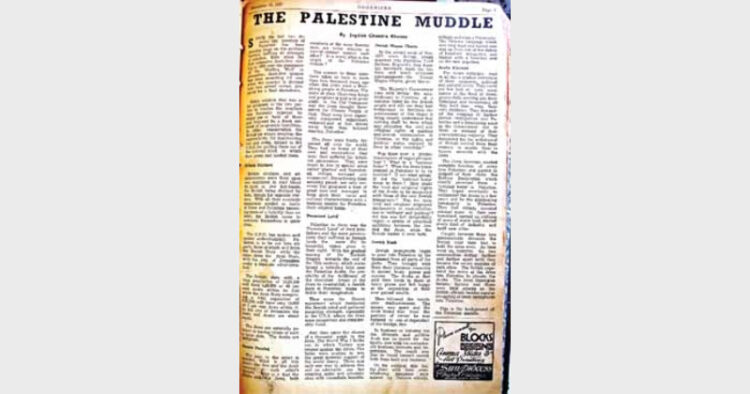| VOL. 1 NO. 23 DELHI: Thursday, Margashirsh Shukla 6, 2004, December 18, 1947 Four Annas |
Since the last two decades, the question of Palestine has been looming large on the political horizon, baffling all attempts at solution. Ever since the first extensive Arab-Jew rioting in 1929 over the possession of the ‘Wiling Wall’ in Jerusalem, Arab-Jew tension has been mounting till now when the country is divided into two armed camps, prepared for a final showdown. Every solution that was so far proposed to the two parties to resolve the deadlock was furiously rejected by either one or both of them and followed by a fresh outbreak of large-scale hostilities.
British Disliked
British civilians and administrators were fired upon and murdered in cold blood by Arab or Jew hot-heads, the British being disliked by both, though for opposite reasons. The UNO has spoken and spoken authoritatively. Palestine is to be cut into six parts, three of which will form the Jewish State while the other three the Arab State, with the city of Jerusalem under a separate administration. The Jewish state with a total population of 10,50,000 will have 5,00,000 or 48 per cent Arabs within its fold while the Arab State comprising a total population of 6,35,000 will have only 15,000 or 2 per cent Jews within it. In the city of Jerusalem the Jews and Arabs are about equal. The Jews are naturally jubilant in having bitten of such a large slice. The Arabs are indignant.
People Puzzled
The man in the street is puzzled. What is all this about — the Jew and the Arab running at each other’s throats. The answer to this questions takes us back to more than two thousand years ago when the Jews were a flourishing people in Palestine. The story of their illustrious kings and prophets is told with great gusto in the Old Testament and the Jews thought themselves the Chosen People of God. They were later repeatedly conquered, suppressed, enslaved and at last driven away from their beloved country, Palestine. Nevertheless these amazing people not only survived but produced a host of great men and managed to keep alive their racial and cultural characteristics with a burning passion for Palestine, their original home.
‘Promised Land’
Palestine to them was the ‘Promised Land’ of their fore fathers and the more persecutions they suffered in foreign lands the more did its beautiful vision glow in their sight. With the gradual waning of the Turkish Empire towards the end of the 19th century, which maintained a tottering hold over the Palestine Arabs, the possibility of the fulfillment of the cherished dream of the Jews to re-establish a Jewish state in Palestine began to tickle their imagination.
Thus arose the Zionist movement which fascinated the Jewish mind and gathered mounting strength, especially in the USA where the Jews were prosperous and considerably vocal.
Jewish Megna Charta
In the second week of Nov 1917 when British troops marched into Palestine, Lord Balfour, England’s then Foreign Secretary, made the historic and much criticized announcement–the Zionist Magna Charta, given below: “His Majesty’s Government view with favour the establishment in Palestine of a national home for the Jewish people and will use their best endeavours to facilitate the achievement of this object it being clearly understood that nothing shall be done which may prejudice the civil and religious rights of existing non-Jewish communities in Palestine, or the rights and political status enjoyed by Jews in other countries.”
Jewish Rush
Jewish immigrants began to pour into Palestine by the thousand from all parts of the globe. They brought with them their immense resources in money, brain power and science.
Arabs Alarmed
The Arabs naturally read in all this a gradual extinction of their gradual extinction of their economic, political and cultural entity. They demanded the stoppage of further Jewish immigration into Palestine.
The Jews, however, wanted complete freedom of entry into Palestine and quoted in support of their claim the Balfour Declaration which clearly promised them a ‘national home’ in Palestine. Caught between these two irreconcilable demands the British tried their best to hold the reins even. As time went on, however, the two communities drifted farther and farther apart until they became the sworn enemies of each other. This is the background of the Palestine muddle.














Comments